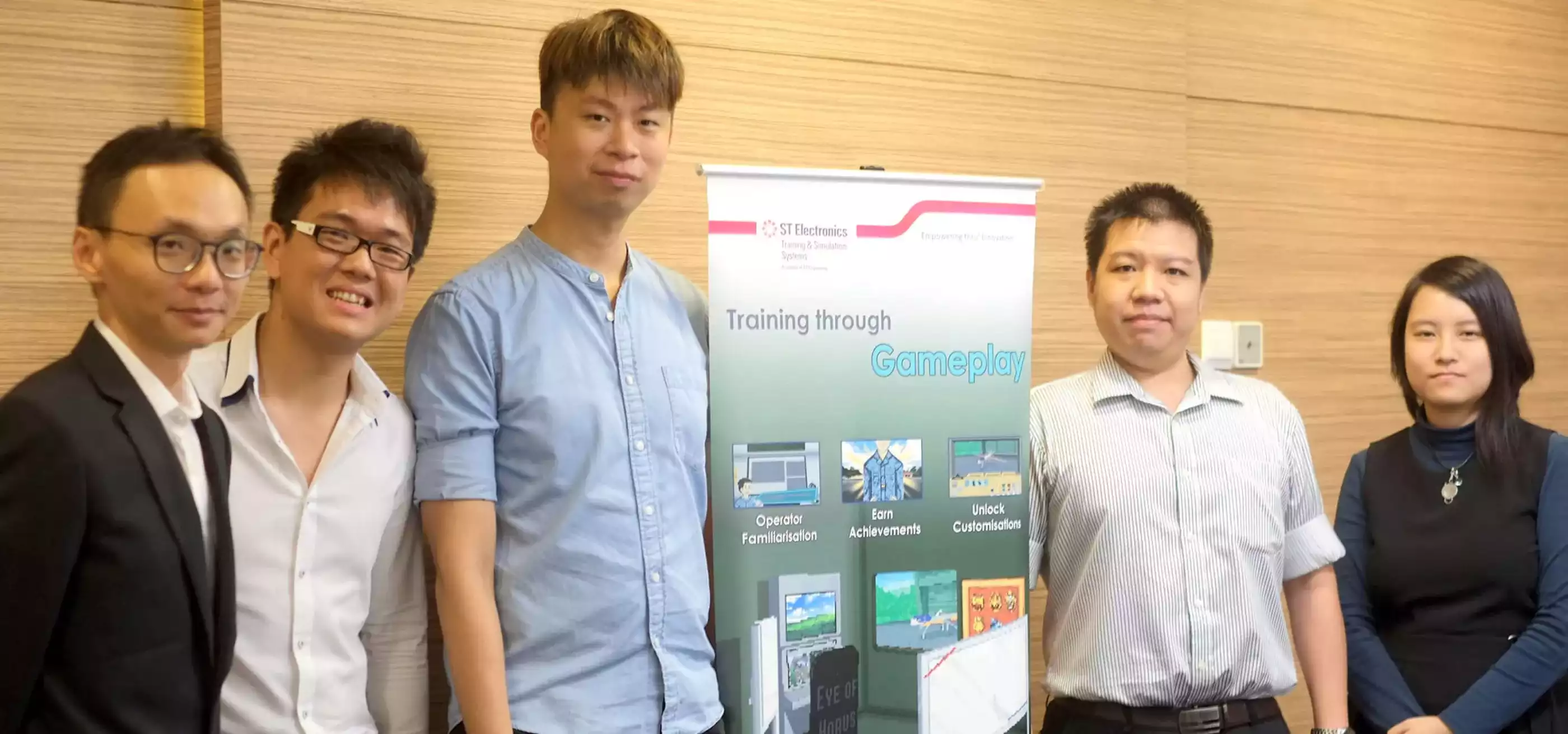When it comes to internships, it is unusual to recruit a complete team from the same university to carry out an important project for a key customer. But at ST Electronics (Training & Simulation Systems) (STEE-T&S), Jonathan Hia, Manager at STEE-T&S, hired a complete game development team from a project class to carry out the task. This arrangement would not have happened if he did not know about DigiPen’s curriculum that places an emphasis on teamwork through its project courses.
“I’ve always wanted to try hiring an entire team upfront, but because of the need for multiple disciplines, it often meant that I had to assemble interns from different courses or schools,” said Jonathan. “It was really helpful when Joe McGinn, the previous Department Chair of Game Software Design and Production, allowed a complete team from DigiPen (Singapore) to complete their internship with STEE-T&S. It saved a lot of effort to form a team on my part.”
The group of interns consisted of four 2016 Bachelor of Arts in Game Design graduates: Davin Chen, Wayne Yam, Shaun Goh, and Grace Tan. While all of them held the title of software engineer, they each fulfilled a set of niche roles within the team, with Grace being the art lead, Shaun as tech lead, Wayne creating audio and tech, and Davin working as the producer. Together, they worked on a special training simulation project for the company.
Having mentored the students during their internship period, Jonathan praised the group’s attitude and initiative. “They started out with the best attitude you can ask for from interns, and they showed a willingness in learning the subject matter,” he said, emphasizing the graduates were dealing with complex subject matter involving maritime and air simulations.
I am happy to see this successful collaboration with DigiPen. As a leading simulation systems provider, we seek talent that demonstrates technical competency, ingenuity, and creative flair for the training solutions that we develop. The internship has proven to be a win–win opportunity for students as well as the company, and we welcome them as part of our big ST Electronics family.”
After finishing their internships, the company offered to hire the team members on a full-time basis, an offer that they each accepted. The graduates said that the sense of ownership that they felt was a driving force that kept them there. “We’ve managed to keep the momentum from the internship to our current project,” said Grace. “Knowing that we would fully own a part of the project also made us want to push ourselves harder.”
Davin added that he now has greater goals within the company since completing his internship. “I personally want to see a game development division created within ST Electronics,” he said. “I want to be able to show others that there is a lot of potential with serious games.”

In addition, the team cites that the game development theory learnt at DigiPen helped them push the idea of training through gameplay. Wayne mentioned that he took a module on making serious games while still studying at DigiPen (Singapore), and Shaun specifically mentioned an assignment that taught him a framework that he still uses in his work today. “There was an assignment where we had to explore how Portal teaches the player without going through a clunky tutorial,” Shaun said. “This assignment became my framework to apply to many things.”
However, the team also faced its fair share of challenges. Wayne said that while they were given the freedom to use whichever engine or pipeline produced the best results for their project, the end goal was often changing, forcing the team to adapt to new direction. “It’s about managing the customer’s expectations,” Shaun said. “Trying to satisfy a client is different than hitting the rubrics in school.”
Even then, the team did share some fun experiences while working together. The group at one point had the opportunity to visit the actual site that related to their work and got to see various types of unmanned systems, as well as learn about their operations. They said that the control station was cold, but the experience itself was exciting. It also helped them learn their subject matter, which in turn helped them make the simulations more realistic.
When asked if Jonathan would like to hire other groups of interns in the future, he said, “Of course!” However, he also said that it depends on finding the right people for the task. “Underlying all this, the team was able to make up for each other’s shortcomings,” he said. “They had the persistence to finish the internship well, despite knowing that internships are usually a trial period where there is nothing to lose. This was why we’ve converted them into full-timers in the end.”
Looking at the fruits of their labour, Mr. Chan Hua Tek, the Executive Vice President and General Manager of ST Electronics (Training & Simulation Systems), had positive things to say.
“I am happy to see this successful collaboration with DigiPen,” he said. “As a leading simulation systems provider, we seek talent that demonstrates technical competency, ingenuity, and creative flair for the training solutions that we develop. The internship has proven to be a win–win opportunity for students as well as the company, and we welcome them as part of our big ST Electronics family.”
